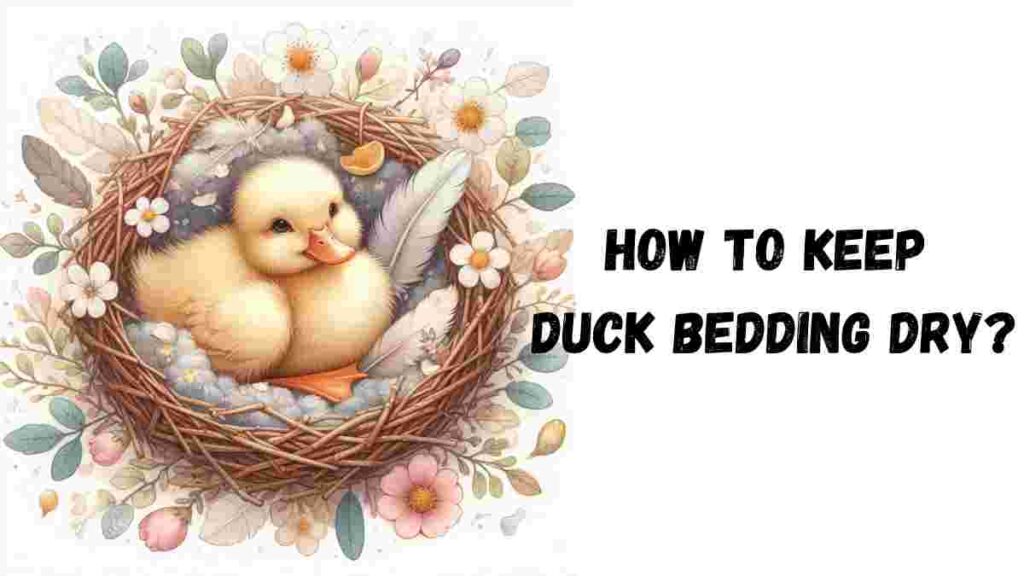How to Keep Duck Bedding Dry: For duck owners, ensuring the well-being of their webbed companions means more than just providing the basics — food, water, and shelter. One often overlooked but crucial aspect of duck care is keeping their bedding dry.
This isn’t just about cleanliness; a damp environment can lead to a host of health issues for your ducks, not to mention increased odors and messy, wet feathers. To maintain the optimal living conditions for your ducks, here are essential tips for ensuring their bedding stays dry, cozy, and safe.
Amazing Wooden Duck Houses At Reasonable Cost

Table of Contents
Why Dry Bedding Matters?
Wet bedding is a haven for bacteria, molds, and fungi, which can lead to respiratory ailments, foot infections (Bumblefoot), and even illnesses akin to pneumonia in ducks. It’s no surprise that the stakes are high when it comes to the moisture level in the area your ducks spend the majority of their time in.
Proper bedding management is also vital for your ducks’ mental health. Ducks, like most birds, derive comfort and a sense of security from a dry, warm nest. Creating an optimal environment can reduce stress, improve sleep, and even bolster egg production in laying hens.
Factors Contributing to Wet Bedding – How to Keep Duck Bedding Dry?
Understanding the culprits that lead to damp bedding is the first step in fighting the good fight. Common factors include the weather, particularly rain and snow, as well as the overall humidity. Inappropriate pen setup — like not providing enough shelters or with poor drainage — can exacerbate this problem. Additionally, some bedding materials are more absorbent than others and will retain moisture, leading to dampness.
Proper Pen Design and Setup
Start by looking at your pen’s design. Do you have a proper shelter to keep the ducks out of the elements? Are there any areas where water is pooling? Your pen should be elevated if possible, with a sloped floor for easy drainage. Enclosed spaces can also be utilized within the pen to allow ducks to seek shelter.

Selecting the Best Bedding Materials – How to Keep Duck Bedding Dry?
The right bedding material can be a game-changer. Straw, perhaps the most traditional choice, is known for its absorbency and insulation. Pine shavings also make for an excellent bedding option, being more absorbent than straw and less likely to get matted down.
Consider the weather and the local climate when selecting bedding. Straw may be better suited to colder, drier regions, whereas pine shavings might fare better in humid climates. Stay away from materials that turn mushy when wet, such as sawdust or mulch, as these can quickly become hazardous to your ducks.
Real-life Experiences and Advice
To provide real-world insight, we’ve spoken to seasoned duck owners to share their wisdom. Here are their experiences and advice for keeping duck bedding dry from dusk ’til dawn:
- “I use pine shavings year-round, topping up the bedding as needed. A good layer not only absorbs moisture but also provides warmth in colder months.”
- “We keep our duck pen covered in a waterproof tarp to shield them from the rain. It’s amazing how much this has helped keep the bedding dry.”
- “Managing your feeding area is just as vital. Ducks can be messy eaters, and spillage can lead to wet patches. Cleaning food and water areas daily has been a game-changer.”
The Impact on Duck Health and Productivity
The big question is, does dry bedding really make a difference? The answer, as reported by many duck owners, is a resounding ‘yes’. Ducks with ample, dry bedding appear to be not only healthier but also more content. Happy, healthy ducks are more productive layers, and if you raise them for meat, well-being directly reflects in meat quality.
Wrapping Up – How to Keep Duck Bedding Dry?
Duck care is a labor of love, and part of that love is in sweating the details. Keeping bedding dry is one of these seemingly little yet pivotal factors. Whether you are new to duck ownership or a seasoned veteran, the dedication to providing a comfortable, safe environment will not only ensure their well-being but will earn you some warm quacks of gratitude.
By implementing the tips outlined in this guide, duck owners can create a dry bedding strategy that suits their unique circumstances. Remember, the key is active monitoring and adjustment. Regular checks of the bedding, especially after bouts of wet weather, will help ensure that your ducks enjoy the benefits of a cozy and dry nest.

Frequently Asked Questions (FAQs) –How to Keep Duck Bedding Dry?
How often should I change the bedding for my ducks?
The frequency can vary based on several factors such as the number of ducks, the size of the pen, and the weather conditions. A good rule of thumb is to check the bedding daily for any wet spots and remove them, with a complete change of bedding every week or two, depending on the level of dampness and dirt.
Can I use newspaper or cardboard as bedding for my ducks?
While newspaper and cardboard can be used as a temporary bedding solution, they are not ideal for long-term use. Both materials can become very soggy and cold when wet, which does not provide a comfortable environment for your ducks. Also, ink from newspapers may pose a risk of toxicity.
Is it better to have an indoor or outdoor pen for ducks?
Ducks thrive in both indoor and outdoor settings, but each has its own advantages and challenges in terms of keeping bedding dry. Outdoor pens allow ducks more natural behavior patterns and space, but protection from the elements and proper drainage are crucial. Indoor pens offer more controlled environments but require diligent management of humidity and cleanliness to prevent damp bedding.
How can I reduce humidity in my duck pen?
Increasing ventilation is key to reducing humidity. Make sure that your pen has adequate airflow while protecting your ducks from drafts. In some cases, using a dehumidifier might be necessary, especially in very damp climates or during rainy seasons.
What should I do if my duck’s bedding gets wet from rain despite taking preventive measures?
If the bedding gets wet despite preventive measures, remove the wet bedding as soon as possible to prevent moisture from spreading. If only a small area is affected, you might only need to replace the wet section. However, if a significant portion is wet, a complete change of bedding might be necessary. To prevent future occurrences, reassess your pen’s design and weatherproofing measures.
